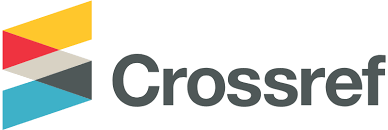PENGARUH PERSEPSI KEMUDAHAN, PERSEPSI KEGUNAAN DAN PROMOSI PENJUALAN TERHADAP PEMBELIAN IMPULSIF
Abstract
The evolution of E-commerce into Social commerce is a new phenomenon in the development of trade in Indonesia. TikTok is one of the social media applications that has participated in this evolution until impulse buying behavior appears among TikTokShop users. Several factors that influence impulse buying in social commerce, especially TikTokShop, are website and marketing factors. Based on this, this study was conducted to explain how the effect of kemudahan yang dirasakan, perceived usefulness, and sales promotion on impulse buying of fashion products by TikTokShop users in Surabaya. This research was conducted using quantitative methods with the type of explanatory research. This research was conducted in Surabaya with the criteria of respondents being TikTokShop users in Surabaya who had shopped at TikTokShop and had bought fashion products at TikTokShop impulsively. The sampling technique was carried out using non-probabilty sampling and purposive sampling with a research sample of 96 respondents, and data analysis using multiple linear regression analysis with the help of the SPSS (Statistical Program for Social Science) version 25.0 program. The results of this study can be said that the perceived ease of use, perceived usefulness, and sales promotions have a significant positive effect partially and simultaneously on the impulse buying of fashion products by TikTokShop users in Surabaya.
Keywords
Full Text:
1 - 11References
Abdelsalam, S., Salim, N., Alias, R. A., & Husain, O. (2020). Understanding Online Impulse Buying Behavior in Social Commerce : A Systematic Literature Review. IEEE Access, 89041–89058.
Ahmad, N., Salman, A., & Ashiq, R. (2015). The Impact of Social Media on the Fashion Industry: Empirical Investigation from Karachiites. Journal of Resources Development and Management, 7(April), 1–8.
Al Mutanafisa, T., & Retnaningsih. (2021). The Effect of Sales Promotion and Knowledge on Impulsive Buying of Online Platform Consumers. Journal of Consumer Sciences, 6(1), 77–91.
Asosiasi Penyelenggara Jasa Internet Indonesia. (2020). Laporan Survei Internet APJII 2019 – 2020. In Asosiasi Penyelenggara Jasa Internet Indonesia (Vol. 2020). https://apjii.or.id/survei
Bhakat, R. S., & Muruganantham, G. (2013). A Review of Impulse Buying Behavior. International Journal of Marketing Studies, 5(3).
Chan, T. K. H., Cheung, C. M. K., & Lee, Z. W. Y. (2016). The state of online impulse-buying research: A literature analysis. Information & Management.
Deric Richards. (2021, August 24). TikTok, in Deal With Shopify, Adds In-App Shopping- webtoday.us. Webtoday. https://webtoday.us/tiktok-in-deal-with-shopify-adds-in-app-shopping/
Huang, Z., & Benyoucef, M. (2013). Electronic Commerce Research and Applications From e-commerce to social commerce : A close look at design features. Electronic Commerce Research and Applications, 12(4), 246–259.
Hussain, A. (2018). Effect of store environment and website characteristics on impulse buying behaviour of university students. University of Bedfordshire.
Katrina, & Benedict. (2021, July 24). Indonesia’s Top eCommerce Product Categories. Janio. https://janio.asia/articles/indonesia-s-top-e-commerce-product-categories/
Kemp, S. (2021). Digital 2021: Indonesia. In Kepios Pte. Ltd., We Are Social Ltd., and Hootsuite Inc. https://datareportal.com/reports/digital-2021-indonesia
Kim, S., Noh, M. J., & Lee, K. T. (2012). Effects of antecedents of collectivism on consumer’s intention to use social commerce. Journal of Applied Sciences, 12(12), 1265–1273.
Kotler, P., & Armstrong, G. (2018). Principles of Marketing (Edisi 17). United Kingdom: Pearson Education Limited.
Lee, H. (2018). Intrinsic and extrinsic motivations affecting impulse-buying tendency in mobile shopping. Social Behavior and Personality, 46(4), 683–694.
Lim, W. M., & Ting, D. H. (2012). E-shopping : an Analysis of the Technology Acceptance Model. 6(4), 49–62.
Silberstein, N. (2021, September 29). TikTok Goes ‘All in’ on Social Commerce with Robust Suite of New Shopping Features. Retail Touch Point. https://www.retailtouchpoints.com/topics/digital-commerce/social-commerce/tiktok-goes-all-in-on-social-commerce-with-robust-suite-of-new-shopping-features
Sinjaya, C., & Santoso, T. (2021). Pengaruh Product Attributes Dan Sales Promotion Terhadap Online Impulse Buying Dalam Produk Chatime Pada Generasi Z. Agora, 9(1), 1–10.
Statista. (2022). Fashion - Indonesia | Statista Market Forecast. https://www.statista.com/outlook/dmo/ecommerce/fashion/indonesia
Surendran, P. (2013). Technology Acceptance Model: A Survey of Literature. International Journal of Business and Social Research, 2(4), 175–178.
The Economist. (2021, October 7). TikTok’s rapid growth shows the potency of video. The Economist. https://www.economist.com/graphic-detail/2021/10/07/tiktoks-rapid-growth-shows-the-potency-of-video
Utami, A. R. (2018). Faktor Yang Mempengaruhi Keputusan Pembelian Produk Fashion Di Lazada Pada Mahasiswa Di Jakarta. Jurnal Industri Kreatif Dan Kewirausahaan, 1(2), 83–90.
Wiranata, A. T., & Hananto, A. (2020). Do Website Quality, Fashion Consciousness, and Sales Promotion Increase Impulse Buying Behavior of E-Commerce Buyers? Indonesian Journal of Business and Entrepreneurship, 6(1), 74–85.
Yahya, S. F. H., Hashim, N. A., Bahsri, N., & Dahari, N. A. (2019). The Effect of Sales Promotion Strategy on Online Fashion Shopping Behavior among Employee of Sahawan Sdn Bhd. International Journal Global Business & Management Research, 11(2), 1–12.
Zeng, K. (2011). Online sales promotion and impulse buying online in the E-business age: A theoretical model approach. ICSESS 2011 - Proceedings: 2011 IEEE 2nd International Conference on Software Engineering and Service Science, 618–621.
Zhang, K. Z. K., & Benyoucef, M. (2016). Consumer behavior in social commerce: A literature review. Decision Support Systems, 86, 95–108.
DOI: https://doi.org/10.36441/kewirausahaan.v6i1.1119
Article Metrics
Abstract views : 617 times
1 - 11 views : 386 times
Dimension Citation Metrics
Refbacks
- There are currently no refbacks.

This work is licensed under a Creative Commons Attribution-NonCommercial 4.0 International License.
Article Metrics
Abstract views : 617 times1 - 11 views : 386 times
Dimension Citation Metrics
Refbacks
- There are currently no refbacks.

This work is licensed under a Creative Commons Attribution-NonCommercial 4.0 International License.
Refbacks
- There are currently no refbacks.

This work is licensed under a Creative Commons Attribution-NonCommercial 4.0 International License.
Jurnal Industri Kreatif dan Kewirausahaan Indexed By:
 Ciptaan disebarluaskan di bawah Lisensi Creative Commons Atribusi 4.0 Internasional.
Ciptaan disebarluaskan di bawah Lisensi Creative Commons Atribusi 4.0 Internasional.








